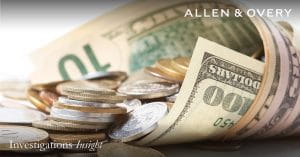- Home
- Blogs
- Investigations Insight
The End of SEC Disgorgement?
Browse this blog post
In Kokesh v. SEC, 137 S. Ct. 1635 (2017), the U.S. Supreme Court held that disgorgement in SEC enforcement actions constitutes a penalty rather than equitable relief. Disgorgement requires a defendant to return the ill-gotten gains obtained as a result of his wrongdoing. The Supreme Court’s decision meant that SEC disgorgement now is subject to a five-year statute of limitations pursuant to 28 U.S.C. § 2462. The ruling had an immediate impact on SEC enforcement actions, as the agency had argued that disgorgement was an equitable remedy and therefore not subject to any statute of limitations. That is, the SEC’s position had been that it could disgorge ill-gotten gains from securities law violations without any limitation on time. In its most recent annual report published on November 6, 2019, the SEC’s Enforcement Division noted the “ongoing impact of Kokesh” and estimated that the Supreme Court’s ruling “has caused the Commission to forgo approximately $1.1 billion in disgorgement in filed cases.”
Tucked away in a footnote to the Supreme Court’s decision was a single sentence that could prove to have a far more significant impact than the Court’s statute-of-limitations analysis: “Nothing in this opinion should be interpreted as an opinion on whether courts possess authority to order disgorgement in SEC enforcement proceedings or on whether courts have properly applied disgorgement principles in this context.” Kokesh, 137 S. Ct. at 1642, n.3.
The Issue
 A recent petition for a writ of certiorari granted by the Supreme Court piggybacks on this footnote and calls into question whether the SEC can obtain disgorgement in enforcement actions filed in federal court. On November 1, 2019, the Supreme Court granted the certiorari petition filed in Liu v. SEC, Case No. 18-1501. The petition was filed by two individuals who were ordered to pay more than $26 million in disgorgement as a result of defrauding non-U.S. investors in connection with an immigrant investor visa program in the United States. The disgorgement obtained by the SEC had all of the hallmarks of a penalty according to Kokesh: it was obtained by a law enforcement agency as a result of violations of public laws; the defendants were not permitted to deduct their expenses from the disgorgement amount; the court ordered the disgorgement to deter the defendants and the general public from violating securities laws in the future; and there was no requirement that any of the disgorged funds be returned to the victims.
A recent petition for a writ of certiorari granted by the Supreme Court piggybacks on this footnote and calls into question whether the SEC can obtain disgorgement in enforcement actions filed in federal court. On November 1, 2019, the Supreme Court granted the certiorari petition filed in Liu v. SEC, Case No. 18-1501. The petition was filed by two individuals who were ordered to pay more than $26 million in disgorgement as a result of defrauding non-U.S. investors in connection with an immigrant investor visa program in the United States. The disgorgement obtained by the SEC had all of the hallmarks of a penalty according to Kokesh: it was obtained by a law enforcement agency as a result of violations of public laws; the defendants were not permitted to deduct their expenses from the disgorgement amount; the court ordered the disgorgement to deter the defendants and the general public from violating securities laws in the future; and there was no requirement that any of the disgorged funds be returned to the victims.
The Liu petition presented the following question to the Court: “Whether the Securities and Exchange Commission may seek and obtain disgorgement from a court as ‘equitable relief’ for a securities law violation even though this Court has determined that such disgorgement is a penalty.”
Petitioners’ Argument
The argument is quite simple. For decades, the SEC has sought disgorgement in federal court enforcement actions, seeking such relief as an exercise of the court’s “inherent equity power to grant relief ancillary to an injunction.” SEC v. Texas Gulf Sulphur Co., 312 F. Supp. 77, 91 (S.D.N.Y. 1970). However, if—as the Supreme Court held in Kokesh—disgorgement in an SEC enforcement action constitutes a penalty, then a federal court’s inherent equity power no longer can justify such relief. Instead, the Liu petitioners argued that disgorgement must be authorized by statute, and Congress has authorized the SEC to obtain only injunctive relief, other equitable relief, and civil monetary penalties in federal court actions. Without any statutory authority to obtain disgorgement as a penalty, the SEC cannot obtain such relief from a federal court. The petitioners argued that their position is bolstered by Congress specifically authorizing disgorgement in SEC administrative proceedings, as opposed to enforcement actions in federal court. Finally, the petitioners noted that it is not just the SEC that improperly continues to seek disgorgement as equitable relief, but rather a host of federal agencies including the Federal Trade Commission, the Environmental Protection Agency, and the Consumer Financial Protection Bureau.
The SEC’s Response
The SEC offered a multi-pronged argument in response. First, citing to a Supreme Court decision from 1946, the SEC argued that a federal court’s disgorgement authority is encompassed by its statutory authorization to enjoin future securities laws violations. Second, when Congress authorized federal courts to order any appropriate or necessary “equitable relief” in SEC enforcement actions, such relief was understood at the time to include disgorgement and so it should be considered as part of the statutory authorization. Third, Congress has enacted numerous statutes that either presuppose or explicitly refer to the SEC’s ability to obtain disgorgement in federal court actions, and a result, the petitioners’ position contradicts the premise of such statutes. Fourth, the SEC argued that the petitioners misread Kokesh to deem disgorgement a penalty for all purposes, rather than solely for determining the applicable limitations period. Both prior to and following Kokesh, the SEC noted that federal courts uniformly have considered disgorgement to be an available remedy in SEC enforcement actions. Finally, the SEC argued that the petitioners waived their argument in the courts below by limiting their challenge to the amount of disgorgement, rather than pursuing a broader challenge to the SEC’s ability to seek disgorgement in the first place. The petitioners disagreed and argued in reply that they raised the broader challenge below, accusing the SEC of excerpting their oral argument to the lower court in a misleading manner.
Outlook
Given the Supreme Court’s recent emphasis on judicial restraint, the Liu petitioners’ attempt to end disgorgement in SEC federal court enforcement actions appears to have a legitimate chance of success. If the petitioners do prevail, the SEC could continue to obtain disgorgement in administrative proceedings, but it could not seek such relief in federal court, which is where the agency typically files its high-profile enforcement actions. Indeed, the petition noted that in January 2019, the SEC obtained $892 million in disgorgement from a single case. Although a decision in the petitioners’ favor would strike a significant blow to the SEC’s enforcement arsenal, the impact may not be long-lived. Despite the current political climate, proposed legislation authorizing the SEC to seek disgorgement in federal court enforcement actions could find bipartisan support in Congress, in particular where such relief is subject to a five-year limitations period. Nevertheless, Liu v. SEC is a case worth following in the months ahead.
